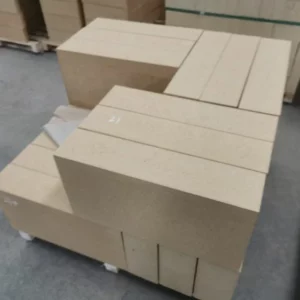Fire bricks are specialized bricks that are designed to withstand high temperatures and are used in applications where heat resistance is required.
There are several types of fire bricks, including:
Insulating fire bricks: These bricks are lightweight and have low thermal conductivity, making them ideal for use in applications where high insulation is required. They are commonly used in kilns, furnaces, and other high-temperature applications.
Dense fire bricks: These bricks are made from high-density materials and have a low porosity, making them more durable and resistant to abrasion and erosion than insulating fire bricks. They are commonly used in applications where high mechanical strength is required, such as in glass furnaces and steel mills.
Acid-resistant fire bricks: These bricks are made from materials that are resistant to acids, such as silica, alumina, and zirconia. They are commonly used in applications where the bricks will come into contact with acidic substances, such as in chemical processing plants.
Carbon bricks: These bricks are made from high-purity carbon and are used in applications where high temperatures and chemical resistance are required, such as in blast furnaces and steel mills.
Magnesia bricks: These bricks are made from magnesium oxide and are commonly used in applications where high temperatures and basic conditions are present, types of fire brick such as in cement kilns and steel furnaces.
Chrome bricks: These bricks are made from chrome oxide and are used in applications where high temperatures and harsh conditions are present, such as in copper and lead smelting.
Overall, the type of fire brick chosen for a specific application will depend on the specific requirements of the application, such as the temperature, chemical environment, and mechanical stresses involved. It’s important to consult with a qualified engineer or technician to ensure that the correct type of fire brick is selected for the application.
Insulating fire bricks and dense fire bricks are two different types of fire bricks that have distinct differences in their properties and applications.
Here are some of the key differences between insulating and dense fire bricks:
Thermal conductivity: Insulating fire bricks have a low thermal conductivity, which means they are better at insulating against heat than dense fire bricks. This makes them ideal for use in applications where high insulation is required, such as in kilns and furnaces.
Density: Insulating fire bricks are lightweight and have a lower density than dense fire bricks. Dense fire bricks are made from high-density materials, which make them more durable and resistant to abrasion and erosion than insulating fire bricks.
Mechanical strength: Dense fire bricks have higher mechanical strength than insulating fire bricks. This makes them more suitable for applications where high mechanical strength is required, such as in glass furnaces and steel mills.
Chemical resistance: Both insulating and dense fire bricks are resistant to high temperatures, but dense fire bricks have better chemical resistance than insulating fire bricks. This makes them more suitable for applications where the bricks will come into contact with acidic or basic substances.
Cost: Insulating fire bricks are generally less expensive than dense fire bricks, due to their lower density and less complex manufacturing process.
Overall, the choice between insulating and dense fire bricks will depend on the specific requirements of the application. Insulating fire bricks are ideal for applications where high insulation is required, while dense fire bricks are better suited for applications where high mechanical strength and chemical resistance are required. It’s important to consult with a qualified engineer or technician to ensure that the correct type of fire brick is chosen for the application.
